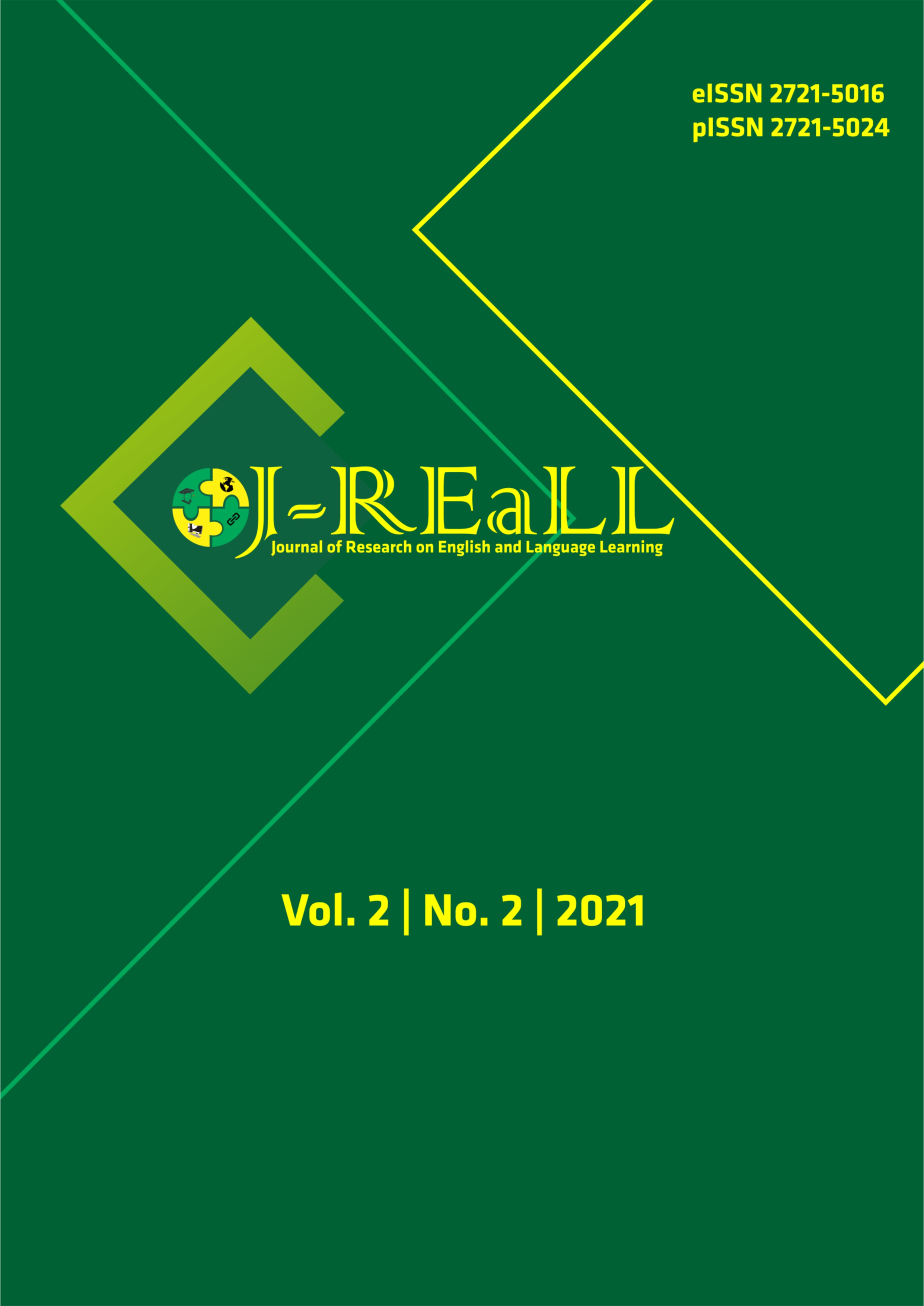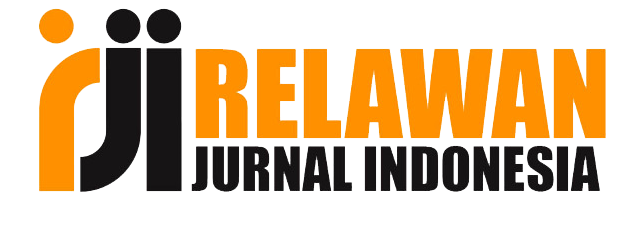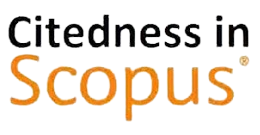Environmental factors affecting learners' autonomy in the covid-19 pandemic
DOI:
https://doi.org/10.33474/j-reall.v2i2.11335Keywords:
online class, learner autonomy, covid-19 pandemic, learner environmentAbstract
Recently, Covid-19 has threatened the education sector and forced learners to adjust an online learning. According to that, learners need to study in their own space and make them more independent and autonomous. However, learners tend to experience difficulties caused by their surrounding environments that sometimes does not support online learning. Surrounding environments include human activities e.g., noise in the surrounding; financial capabilities of parents for internet data plans; or other issues beyond the student's intellectual abilities. Therefore, this research aimed to explore the existed environmental factors that affected the learning environment and define the factors which affected learners' volition. This study was applied a qualitative method and presenting the collected results descriptively. The researcher worked with one English teacher who has been voluntarily participating in this study. This study used semi-structured interview and questionnaire as the research instruments. Firstly, the researcher sent the questionnaires using Google Form for all students at 11th graders from one of the government-owned senior high schools in Surabaya. Secondly, the researcher interviewed an English teacher to find out the class' conditions. This study has revealed that teacher still holds huge responsibilities to guide students along the online learning process. Besides, there were still a lacks IT skills of students which make the teacher not only a facilitator but also a helper or counsellor. This dominant role of the teacher eventually made students less autonomous.
References
Ahmad, Hasnawati, Mulyadi, Apriyanto, M., Oklianda, A., Putra, D. D., & Warmi, A. (2021). Student Responses during Online Learning in the Covid-19 Pandemic Period. Journal of Physics: Conference Series, 1764(1). https://doi.org/10.1088/1742-6596/1764/1/012125
Allo, M. D. G. (2020). Is the online learning good in the midst of Covid-19 Pandemic? The case of EFL learners. Jurnal Sinestesia, 10(1), 1-10.
Almusharraf, N. (2020). Teachers' perspectives on promoting learner autonomy for vocabulary development: A case study. Cogent Education, 7(1). https://doi.org/10.1080/2331186X.2020.1823154
Almusharraf, N. (2018). English as a foreign language learner autonomy in vocabulary development. Journal of Research in Innovative Teaching & Learning, 11(2), 159-177. https://doi.org/10.1108/jrit-09-2018-0022
Biswas, B., Roy, S. K., & Roy, F. (2020). Students Perception of Mobile Learning during COVID-19 in Bangladesh: University Student Perspective. Aquademia, 4(2), ep20023. https://doi.org/10.29333/aquademia/8443
Dang, T. T. (2020). Learner autonomy-promoting practices in a transition environment. (November), 3-8.
Hermagustiana, I., & Anggriyani, D. (2020). Language Learner Autonomy: The Beliefs of English Language Students. IJEE (Indonesian Journal of English Education), 6(2), 133-142. https://doi.org/10.15408/ijee.v6i2.15467
Ivanovska, L., Kasaposka-Chadlovska, M., & Kolevska-Neshkovska, S. (2020). Online Foreign Language Teaching. IAI Academic Conference Proceedings, (May), 57-67.
Kiatkheeree, P. (2018). Learning Environment for Second Language Acquisition: Through the Eyes of English Teachers in Thailand. International Journal of Information and Education Technology, 8(5), 391-395. https://doi.org/10.18178/ijiet.2018.8.5.1069
Lodge, J. M., Kennedy, G., & Lockyer, L. (2020). Preprint to appear in Carroll, A., Cunnington, R. & Nugent, A. (eds.: 2020) Learning under the lens: Applying findings from the science of learning to the classroom.
Maydiantoro, A., Winatha, I. K., Riadi, B., Hidayatullah, R., Putrawan, G. E., & Dzakiria, H. (2020). (Emergency) Online Remote Learning in Higher Education Institutions during COVID-19 Crisis: Students' Perception of the Situation. Universal Journal of Educational Research, 8(12), 6445-6463. https://doi.org/10.13189/ujer.2020.081210
Muianga, X., Klomsri, T., Tedre, M., & Mutimucuio, I. (2018). From Teacher-Oriented to Student-Centred Learning: Developing an ICT-Supported Learning Approach at the Eduardo Mondlane University, Mozambique. TOJET: The Turkish Online Journal of Educational Technology, 17(2), 46-54.
Nugroho, A., Zamzami, M. R. A., & Ukhrowiyah, N. F. (2020). Language input, learning environment, and motivation of a successful EFL learner. Journal on English as a Foreign Language, 10(1), 46-69. https://doi.org/10.23971/jefl.v10i1.1511
Oveshkova, A. N. (2018). Work with English corpora as a means of promoting learner autonomy. Obrazovanie i Nauka, 20(8), 66-87. https://doi.org/10.17853/1994-5639-2018-8-66-87
Player-Koro, C. (2012). Factors Influencing Teachers' Use of ICT in Education. Education Inquiry, 3(1), 93-108. https://doi.org/10.3402/edui.v3i1.22015
Rinesko, A. B., & Kurniawan, E. (2020). Fostering language learner autonomy through the involvement of ICT: Teacher's perception. Enelish Language Teaching and Research Journal, 4(2), 1-14.
Sampson, R. (2012). The language-learning self, self-enhancement activities, and self perceptual change. Language Teaching Research, 16(3), 317-335. https://doi.org/10.1177/1362168812436898
Stockwell, G., & Reinders, H. (2019). Technology, Motivation and Autonomy, and Teacher Psychology in Language Learning: Exploring the Myths and Possibilities. Annual Review of Applied Linguistics, 39, 40-51. https://doi.org/10.1017/S0267190519000084
Teoh, G., & Sai, B. (2017). the Wonders of Mobile Phone Technology. 3(January), 57-68.
Tran, T. Q. (2020). EFL students' attitudes towards learner autonomy in English vocabulary learning. English Language Teaching Educational Journal, 3(2), 86. https://doi.org/10.12928/eltej.v3i2.2361
Vanwelsenaers, M. (2012). Students Using Their Own Technology Device in the Classroom: Can "Byod" Increase Motivation and Learning. 1-26.
Vidaček-Hainš, V., Prats, H., & Appatova, V. (2010). Personal efficacy and factors of effective learning environment in higher education: Croatian and American students. Journal of Information and Organizational Sciences, 34(1), 153-158.
Werang, B. R. (2018). Investigating students' learning motivation in Indonesian higher institution: A study from Musamus University of Merauke , Papua. International Journal of Development and Sustainability, 7(3), 1038-1048.
Downloads
Published
How to Cite
Issue
Section
License
Copyright (c) 2021 Wahyu Pratama, Rahayu Kuswardani

This work is licensed under a Creative Commons Attribution 4.0 International License.
Authors who publish this journal agree to the following terms:
- Authors retain copyright and grant the journal right of first publication with the work simultaneously licensed under a Creative Commons Attribution License that allows others to share the work with an acknowledgement of the work's authorship and initial publication in this journal.
- Authors can separately make additional contractual arrangements for non-exclusive distribution published by the journal (e.g., publish it in a book), with an acknowledgement of its initial publication in this journal.
- Authors are allowed and encouraged to send their work via online (e.g., in the institutional repositories or their website) after published by the journal.






















